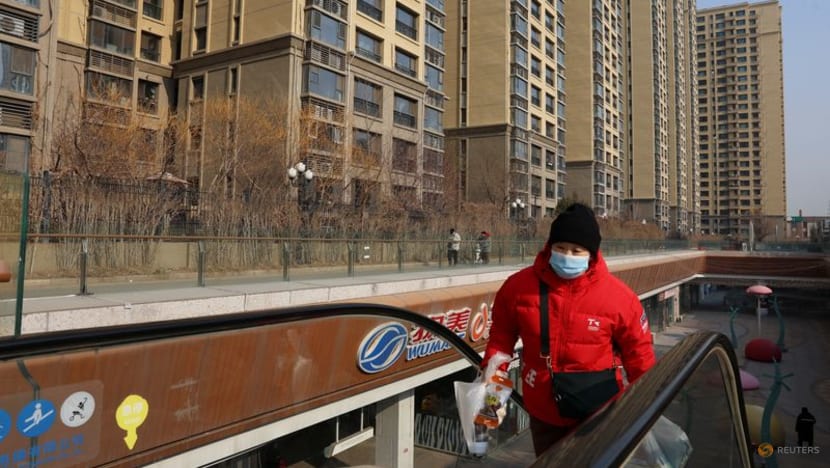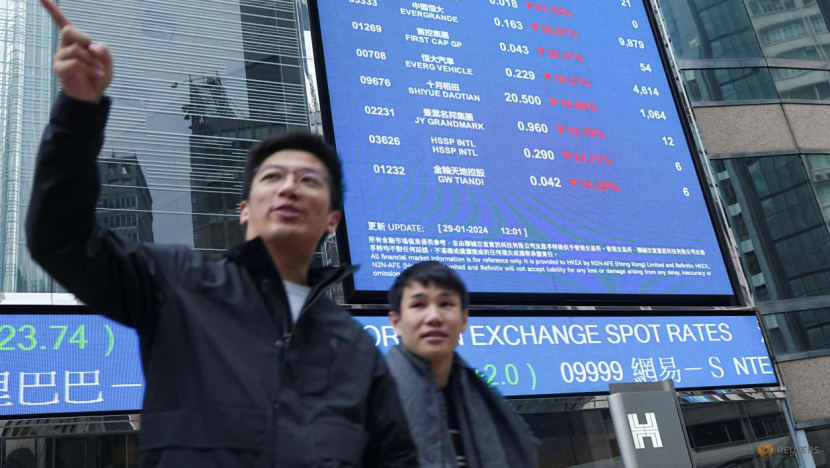What does Evergrande’s liquidation mean for other property developers in China?
The world's most indebted developer, with more than US$300 billion of total liabilities, was on Monday (Jan 29) ordered by a Hong Kong court to wind up.


This audio is generated by an AI tool.
The liquidation order by a Hong Kong court on beleaguered property giant China Evergrande Group is unlikely to put a further dent on the already-struggling Chinese property sector in the short-term, said observers.
The world's most indebted developer, with more than US$300 billion in total liabilities, was ordered by a Hong Kong court on Monday (Jan 29) to wind up.
Justice Linda Chan decided to liquidate the company after it was unable to provide a concrete restructuring plan despite several court hearings and around 18 months of failed negotiations with offshore creditors.
However, the move did not come as a surprise to observers.
WHAT HAPPENS NOW?
The Hong Kong court order is “more or less expected, and it is only a matter of when this would happen”, said Dr Tommy Wu, a senior China economist at Commerzbank.
“The offshore creditors have not been able to agree or accept the restructuring plans offered by Evergrande,” he added.
“The actual impact will depend on how the liquidation process will proceed. Perhaps in the worst case, Beijing will probably have to step in.”
The liquidation is expected to be a long, drawn-out process with potential political implications, said experts.
A provisional liquidator and then an official liquidator will be appointed to take control and prepare to sell the developer's assets to repay its debts.
The liquidators could propose a new debt restructuring plan if it is determined that the Guangzhou-based firm has enough assets or if a white knight investor emerges. They could also refer suspected misconduct by directors to Hong Kong prosecutors.
The process, however, could be complicated, and face cross-jurisdictional issues as most of the developer’s assets are located in mainland China, said experts.
It is not clear whether the Hong Kong court order could be enforced onshore, Dr Wu told CNA’s Asia Now on Monday.
“Hong Kong and mainland China are two different jurisdictions, so this will be a challenge,” he said.
“If there's no court in mainland China that actually recognises this Hong Kong court case, then perhaps there are limited things that the provisional liquidator in Hong Kong can do.
“(Even) if there is a court in mainland China that actually does recognise this court case, I think this will still be a long, drawn-out process.”

He added that “a lot of the Evergrande projects involve a lot of its local subsidiaries, and involve a lot of local governments and local authorities”.
“A lot of the economic and political considerations will have to be taken into account, and so it's actually going to be a very complex process for the liquidator to handle,” Dr Wu said. “And even if they can handle it, it'll take a long time.”
This could take years to resolve, said China market analyst Hong Hao, adding that the recognition from the Chinese authorities on the Hong Kong court ruling alone could take some time. “I think right now, it's still early days.”
HOW WOULD LIQUIDATION AFFECT CHINA'S PROPERTY MARKET?
The Evergrande crisis has offered a glimpse on how liquidation might unfold for other embattled real estate developers, and “give some sort of a roadmap for other developers”, said Mr Hong, chief economist at Shanghai-based GROW Investment Group.
Related:
“There are many other developers that are more or less the same size, and they are facing similar challenges as well,” he told CNA’s Asia First on Tuesday.
“I think, at this stage, it is way too early to draw a conclusion that this is probably the end of the saga. It's the beginning for the other developers.”
Dr Wu added that the sentiment in the property market has been fragile.
“A lot of that has to do with the fact that a lot of developers have been defaulting and were unable to complete their housing projects,” he said.
“So this is going to have an impact in terms of creating worries over whether more developers will suffer from the same problem, and (if there would) be implications with regard to property developers financing.”
Mainland authorities have so far prioritised the completion of unfinished projects by developers.
Related:
HOW MUCH WOULD EVERGRANDE’S CREDITORS RECOVER?
Meanwhile, creditors stand a slim chance of making an effective claim onshore.
“The liquidator can obviously take control of the assets in Hong Kong, but most of the assets of Evergrande are actually sitting onshore inside mainland China,” said Dr Wu.
“So if the liquidator does not have the power, because if the court order is not recognised in mainland China, then there's only limited things that they can do in that case.”
Creditors now expect a recovery rate of less than 3 per cent, according to reports.
“In terms of how much value you can salvage from the assets, as we all know that when you're doing a fire sale, much of the assets can be sold at very little value,” said Mr Hong.














